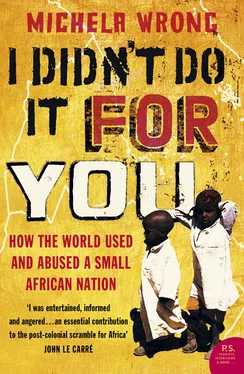In the early hours of March 25, the British played their final card. Two brigades attacked on either side of Dongolaas Gorge, one unit working its way silently along what proved to be a poorly-barricaded railway tunnel high on the ridge, the other moving up from Fort Dologorodoc. By the morning of March 27, a last desperate Italian counterattack had been repulsed and sappers had cleared the pass. The guns fell silent as white flags shot up from Italian soldiers on the peaks. With his units in tatters, Frusci had ordered a withdrawal, congratulating his soldiers for their heroism in a florid declaration. âOur many dead, who include one general and five senior officers, remain in Keren as armed guards and a warning to the enemy. We have left Keren only temporarily,â he promised, unconvincingly. âWe will soon return there and the sacred flag of our country will once again flutter in the light of our future glory.â 16
If Platt had fulfilled his pledge to last longer than his opposite number, it had only been by a hairâs breadth. The British had come within a whisper of calling off the assault. The general later confessed that in the last three days of the battle, his reserves had shrunk to just three tanks. âA company commander said to me when he heard that, âWas that quite sound sir?â No, it was contrary to every book that had ever been written, but it came off.â 17
The battle of Keren was over and with it, Italyâs most spirited military performance of the Second World War. The official Italian tally was 3,120 dead â a total that characteristically omitted around 9,000 Eritrean and Ethiopian ascaris who had fallen alongside their European comrades. 18 British forces, which had pulled off what was as much a quartermasterâs as a soldierâs victory, had lost between 4,000 and 5,000 men. 19 Added together, both sides had probably sustained more than 50,000 casualties, averaging out at around 1,000 dead and wounded each day. âIt was incredibly tough, and it is a source of wonder how we ever succeeded,â an officer in the West Yorkshire Regiment later recalled. âIt will never, like some battlefields of the First World War, look small and insignificant, but will stand always, huge and rugged, the gateway to Eritrea.â 20
The feared escarpment had gone from insurmountable threat to just another geological feature. The Pimple, the Pinnacle and the Sphinx were no longer of any interest to the British soldiers who had crouched in the dust, trying to guess what hidden gullies and unexpected ridges â the dips and bumps that held the key to survival or destruction â lay ahead. As instructions were shouted, equipment packed and trucks and tanks jostled, nose to tail, for their place in the grey-green caterpillar working its way up Dongolaas Gorge, past the inevitable anti-climax that was Keren itself, the men were already forgetting a landscape they would never see again. For many, there was a dreamlike quality to the sudden telescopic shift in focus. âIt always surprised me, in any battle, how limited oneâs life was while the battle was going on,â remarked Kerr. âYou knew every stone for the next 50 yards. It always struck me as extraordinary how when a battle ended, like in Keren, how the next day the birds were there, peace reigned, the place was in a bit of a mess, suddenly there were trees and everyone walking about and standing up in daylight and one wondered at how different it was from yesterday, a different world entirely â what had we been doing all those weeks? At one moment somewhere is a battlefield and life is being lost right and left. And the next day, total peace and silence.â 21 The convoy roared through Keren â âa pathetic little townâ, commented Richard Dimbleby, before putting it out of his mind forever â and ground on to Asmara.
Frusci was to stage a series of rearguard actions further up the Imperial Way, but his men had lost their stomach for the fight. The trouble with Maginot lines, as military strategists know, is the symbolic significance they come to acquire in the eyes of those who shelter behind them. When they collapse, so does the notion of further resistance. The Italians knew that they were not going to stumble on a better position than Keren, and Keren had gone. A few days later, Dimbleby, who had given his radio listeners a crisply eloquent account of the campaign, watched open-mouthed as a small touring car loaded with Italian officers and dignitaries, waving a large white flag, drove past him. They had come to negotiate a surrender. On April 1, Asmara was declared an open city, saving its elegant boulevards from the ravages of British artillery. Massawa fell a week later. After half a century of occupation, the Italians had lost their first-born colony, and with that defeat the surrender of Ethiopia to the south became a matter of time.
Mussoliniâs new Roman Empire was imploding, and Eritreaâs surrender freed up the troops Wavell desperately needed. They were allowed only the briefest of breathing spaces before being whipped away to fight Rommel. Had Keren not fallen when it did, British morale, bruised by Dunkirk and the Blitz, might never have recovered. Its conquest was a small but crucial part in turning the tide of the Second World War, from a position where a vast Nazi empire seemed a certainty to a point where Allied victory was for the first time conceivable.
Strikingly absent from this whole strategic picture â staggeringly absent, indeed, from all the vivid veteransâ memories and detailed military reports on Keren â is any mention of the people most immediately concerned by the events of 1941: the Eritreans themselves. The British soldiers who fought in Keren struggle to recall a single encounter with a local, an unsurprising lacuna, perhaps, given that until Asmara, Eritrean towns had either been bombed or marched through by the Allies, but never occupied or administered. Asked about the Eritrean countryside, one officer mused, âThere was no countryside, really,â as if he had been marching across a blank vista. What the invaders retained was the impression of a landscape bereft of people, stripped of vegetation, a moonscape so desolate it seemed the ideal setting for a war. As for the Italians, the words they ordered to be carved on the white gravestones erected over the tombs of every Eritrean and Ethiopian who fell at Keren say it all. âAscaro Ignotoâ â âUnknown Ascaroâ. The Italians didnât even know the names of the natives who died for them.
The post-independence Kenyan politician Tom Mboya used to recount how a white customer once poked her head into the office where he was sitting working, looked around, and said: âAh, nobody here,â as an example of how colonial assumptions about authority rendered blacks effectively invisible. There are echoes of the Tom Mboya experience for the Eritreans at this juncture in their history: to the outside world they seemed as insubstantial and transparent as the chill mountain air. Despite all the promises made in the leaflets sprinkled by the RAF, Britain had not invaded Eritrea to free the natives from colonial rule. It had fought the battle of Keren for strategic reasons that stretched far beyond Eritreaâs borders and bore no connection to local wishes, a matter of supreme indifference, at this stage, to London.
It is a view of the world reflected in the story that has passed into Eritrean history concerning Keren. In a way, it doesnât really matter whether the tale is apocryphal or not, because it says so much about the gathering cynicism of a people who had come to understand their country was no more than a proxy location for a war, this merely a dress rehearsal of the great fight between Fascism and Liberal Democracy that would be concluded elsewhere.
Читать дальше












